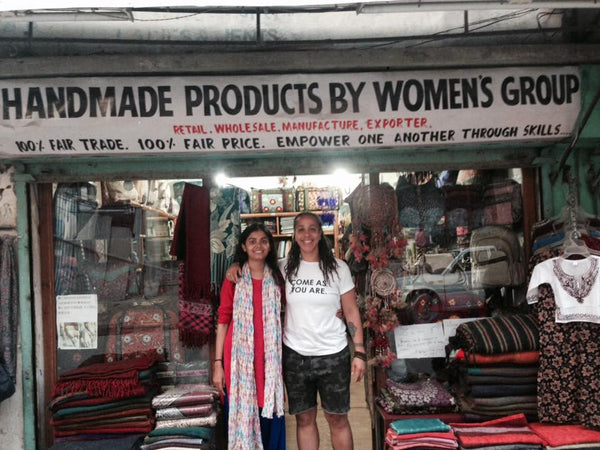Help Women empowerment in Nepal
Please we need your support to help the women in Nepal !
Starting July 23rd to July 31st, during these 9 days with each pre-order* of any jewelry in the Wishbone Collection and/or Sakti Collection, a portion of the profit will be given to Women Health Hygiene and Educational program to support their Sanitary Pads Distributions to Women in Nepal.
Do not forget to redeem your 15% off Coupon "9LWHNEPAL" at the checkout !
* It is a pre-order sale, your order will be shipped between 2 to 3 weeks after the 31st of July.
Thank you, Thank You, Thank YOU in advance for your kind support ! As I can't do that by myself alone ! UNITED, ALL TOGETHER WE ARE A DRIVNG FORCE THAT CAN MAKE A DIFFERENCE !
LovLov
Celia
They have distributed 1180 pieces of Pads in two and half months. 4 school and one to a Community women’s group.
Thank you so much for supporting with this project.
this is how their story starts when they went to one of the village where they distributed the pads with our support.
One fine Sunday morning, three young ladies set out on a mission.
They packed a cab from the trunk to the roof with their goods and set out from Kathmandu and set out into the fresh air of the valley with their sights set on a small village in the district of Nuwakot.
After a harrowing taxi ride on slick mud, getting out to push the car over threatening mounds, and catching air in the bumpy back seat, they could scarcely believe they had make it to their destination in one piece. "There was an air of relief as we rolled onto the grounds of Chaughada Higher Secondary School" Nasreen said. Curious eyes peered out from open-air classrooms as little hands pushed back the shutters to get a better view. Visitors from outside the village would be rare, and with the likes of the roads they had just experienced, it’s no wonder this school had never seen an outreach of this kind before.
The great big sacks they now unloaded from their little cab were filled with handmade sanitary kits, donated by kind sponsors and friends of LWH, to distribute to the students and women of the village. Each pretty drawstring-bag contained two reusable, antibacterial, waterproof fabric pads with several changeable inserts, along with a pair of cotton panties and soap. Each kit represents a completely sustainable and feasible system for women’s wellbeing during their period.
More than just these kits, however, and more importantly, they were there to distribute knowledge. Most schools of this kind in remote areas of the country will not provide health class or sexual education. Girls of a pubescent age will likely go without learning about menstruation whatsoever. The onus is on the family, then, to teach them, but circumstances might not always allow it. Without the proper education, young girls might feel utterly lost and confused. Many miss classes, skipping school altogether during their periods out of shame, embarrassment, or sheer practicality.
Our goal with LWH is to put a stop to this cycle. By teaching girls about menstrual health and providing them with the tools necessary to feel comfortable during their period, We are empowering the next generation of Nepali women to put their education first and demonstrating that nothing can get in the way of their success.
In four separate classrooms they delivered a lesson about a woman’s menstrual cycle—how to track it over the course of several months, how the flow changes over the days, and what to expect. She emphasized the importance of menstruation in the scheme of human reproduction and gave helpful tips with how to deal with cramps and other pains associated with one’s period, like healthy eating, doing stretches, and using a hot water bottle.
As some of the girls expressed that they already use disposable pads, We highlighted the negative impacts of plastic products on the environment. Regular sanitary napkins takes 800 years to decompose, which is a problem the whole world is facing but is particularly relevant in a country with such a waste problem as Nepal.
The girls listened in, at times falling prey to fits of giggles, at times letting loose naïve looks of horror, but their relaxed demeanor helped coax them through. "It was wonderful to see some of the older girls so engaged, asking questions and discussing with their friends. You could see all of the girls’ eyes light up during the talk as they took it all in" said Nasreen.
Handing out the kits to a chorus of thank you just lit a fire for us to carrying on teaching in every following class. In the final class, some of the women from the village joined in as well. It was incredible seeing the happiness on their faces to be offered something so thoughtful when they have so little. Their gratitude was overwhelming, many of them inclined to give them big hugs as they went away smiling. They settled into their homestay a little farther up the road in Chaughada for some much needed rest that evening.
In the morning they found themselves left with a lot of energy and a good number sanitary kits remaining, which we planned to give out to many more of the villagers. They went out, walking up and down the road, compelling any willing woman to come and join for a discussion. Slowly women of all ages started filtering into the shady garden of our host. After fifteen minutes dozens of women had piled in waiting eagerly.
They delivered their lesson to this familiar group, sparking much debate and questions. The energy was very exciting, like a town hall, with so many women’s voices being heard. Even more remarkably, they found a couple young women who showed particular interest in the project. From the inception of this project they had it in mind to connect with potential community leaders who could help them maintain ties with the village and transform this outreach from a one-off into an ongoing project. A young lady called Santoshi to express the keen desire to work with them, so the two exchanged ideas and contact information. The hope would be to continue the dissemination of information through our one of our new team Santoshi so that their effects can continue to spread even after we’d left. We even presented the possibility of creating a center there where the women of the village could produce more of the sanitary kits or other products, benefitting their livelihood and growing the community of Local Women’s Handicrafts.
The overnight trip left them all feeling very powerful, inspired, and enriched for having interacted, engaged, and exchanged with so many incredible women in a village not so far away, and yet so far removed from the Kathmandu scene.
When they left Nuwakot they felt positive about the future. They felt grateful to all of you, wonderful friends and supporters who had lent a hand to the women of Nepal. Our intention is to give a step up to women here and create a platform for them to grow and be empowered.
"Give a woman a fish and feed her for a day, teach a woman how to fish and feed her for a lifetime" - Female proverb
You can support Women in Nepal and future sanitary pad distributions with any purchase of Celia de flers Jewelry @celiadeflers.com, via Bodhaya page on Facebook and here : http://www.locwom.org/
Leave a comment
Comments will be approved before showing up.


